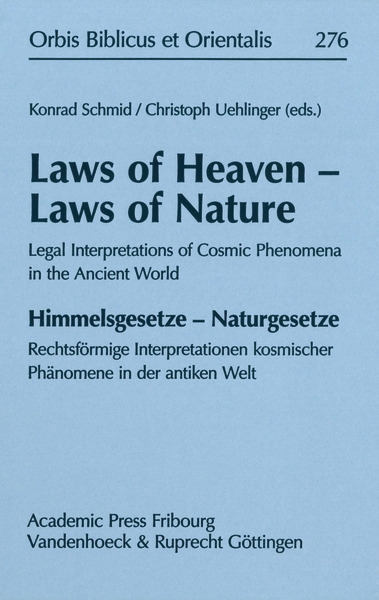

 0
EN
0
EN

In Western academic contexts, the idea of “laws of nature” is often regarded as having originated among the pre-Socratics, Plato, and the Stoics. But this view is historically incorrect. Legal interpretations of cosmic phenomena go back to the ancient Near East, where such understandings also emerged in the Hebrew Bible. The authors analyzes texts relevant to this topic, developing a fresh approach to portrayals of ‘laws of nature’ from antiquity. Konrad Schmid draws attention to some blind spots of Western history of science and to biblical texts mentioning “laws of heaven”, “laws of heaven and earth” or “ordinances” imposed on the moon and the stars. Such concepts can be compared to the Mesopotamian concept of a supreme god establishing like a legislator the rules of cosmic order. That background is elucidated in detail by F. Rochberg, whose contribution considers the Mesopotamian trope of the divine judiciary and its extension to the physical world, and discusses the question whether the case-law formulation of Akkadian omen statements (protasis-apodosis, “if P, then Q”) should be understood as evidence for a law-like understanding of cosmic order. W. Horowitz starts from Gen 9:12–17 to study the Akkadian terminology and ominous interpretations of the rainbow, which can be either benefic or malefic. F. Naether in a broad survey demonstrates that in Egypt, too, divination operated with law-like notions; she reviews texts which discuss natural phenomena without necessarily relating them to divine agency, and identifies early attempts to a “philosophy of nature.” D. P. Wright, who offers a detailed study of law and creation in the Priestly-Holiness writings of the Pentateuch, highlights the differentiation established between universal conditions in creation, on the one hand, and knowledge (on sacrifice, the calendar, purity and holiness, the name of Yahweh and his kābôd) made specifically available to Israel as Yahweh’s chosen people, on the other. J. L. Cooley analyzes Isa 2:1–4 against the background of ancient Mesopotamian divination, concluding that the biblical oracle provides a counter-narrative to Mesopotamian traditions regarding the effectiveness and antiquity of its divination tradition. M. Albani argues that in 1 Henoch the focus on astronomy and astral regularity forms the basis of an ideal calendar of 364 days, whose constance should serve as an antidote to anomia experienced in Hellenistic-period “Enochic Judaism”. J. Hüfner, professor emeritus of theoretical physics, reviews some elementary astronomical principles discovered in antiquity, such as periodicity, increasing use of mathematics, and of models to apprehend the planetary system. C. Uehlinger summarizes common views and divergencies between the various materials surveyed, stressing the problematic status of the concept of “nature” with regard to ancient Near Eastern materials and pointing out the longevity, all but obvious after all, of the legal metaphor which still operates in contemporary discourse on the "laws of nature.”"



